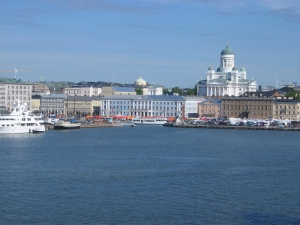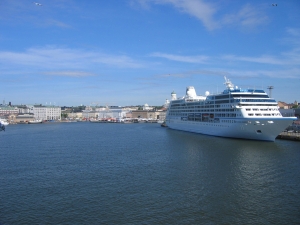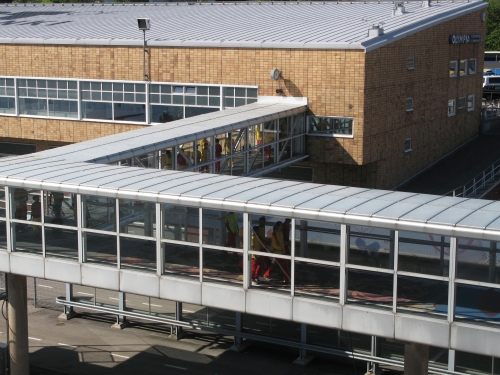We are decamped to where birdsong dominates. Here the Baltic Sea still looks lovely even as the battle against using it as a dump falters.
Meanwhile, like every Midsummer, Helsinki has apparently been given over to the tourists and the seagulls.
Looking at the results of the City Planning Department’s South Harbour Ideas Competition, it’s clear that the summer and the tourist (not least the Baltic Sea cruise passengers) are very much to the fore in the city managers’ thoughts.
For me the images highlight the gulf between my dreams and the dreams (?) of those who manage the city. Once again they have followed the usual and deadening formula: rhetoric of vitality + Computer Aided Design = winning entry.
I love the South Harbour, iconic view and image, and still as real as the pain in my toe. What, I wonder, do the tourists make of the market square and its surroundings?
If they are arriving cruise passengers, what do they perceive? An interesting city scape? Or other cruise ships six times the size of the largest edifices anchored on dry land?
JHJ had the pleasure of arriving by ship just last week. Beautiful. Interesting. People doing stuff.
The Harbour, at least from a distance, looked like a hive of real activity.
It made me think of a recent essay by that unbelievably prolific anthropologist David Graeber, called ‘Of flying cars and the declining rate of profit’. What, the essay ponders, are we all so busy with?
In Helsinki it wasn’t so long ago that office workers, university people and perhaps some local housewives (and at least one -husband I know of) frequented the market, the market-hall and the area around, for shopping, meeting, taking boats to islands and passing through on their way to somewhere else. And a good few people used to work here.
Some still do.
Not that there is that much work for dockworkers. Plenty of work for cleaners though. A startling proportion of those we saw appear to be darker skinned than most Finns.
Back to Graeber. I understood him to be saying that capitalism + computing has managed to reduce us all to administrators of our own and others’ lives. Creative doing is as hard as creativity-talk is necessary. All creatives do is try to sell.
The Planning Department and the City are selling Helsinki. As JHJ noted in an earlier post, this involves lots of image-making. And endless power-points accompanied by linguistic novelties like the “future dogmatic” or “future positive”, supposed to make us gaze misty-eyed into the lovely future and forget about the mess we continue to produce (my thoughts returning once more to the poor old Baltic).
The South Harbour Jury Report (available on this page), though not quite completely information-free, is pretty much in this vein of vacuous rhetoric. (But was the only thing they were looking for a way to get a decent cycling facility to get through the bottleneck of the market?)
P.S. Only one of the 4 winning entries, Meren Syleily, mentions work that’s not related to entertainment. Shame the prose is so complicated.
Keeping working
Just as importantly none of the proposals run counter to the essential requirements of the shipping terminals, ensuring that the activities of the port can continue unaffected, unconstrained by the imposition either of new obligations or overlapping functions.





 But the thing that makes an urban rhythm stick, and that recent strikes have reminded urbanites of, is the routine requirement for economic activity. You’ve got to work, basically. And if you can’t find paid work that you’re qualified for or able to do, or you’re discriminated against because of a recognised, not valued identity, or because of ill health, or because you’re doing upaid work looking after someone else, or because you have a disability, well, all those things shape your urban rhythms too.
But the thing that makes an urban rhythm stick, and that recent strikes have reminded urbanites of, is the routine requirement for economic activity. You’ve got to work, basically. And if you can’t find paid work that you’re qualified for or able to do, or you’re discriminated against because of a recognised, not valued identity, or because of ill health, or because you’re doing upaid work looking after someone else, or because you have a disability, well, all those things shape your urban rhythms too. So, will the Dodo folks pick up on the fact that the law was changed only a few months ago to allow for longer opening hours, and thus (in)advertently supporting the big chains and weakening alternatives like market halls and small shops? The new law was bemoaned then not just by religious leaders but by shop keepers, people on low salaries being drawn into ever more anti-social working hours, and types like me who just think that non-stop consuming is bad for the soul, the planet and for a decent city life. And will they be able to talk about the negatives that come with these inherently positive-sounding things like flexibility without sounding nostalgic for times that never existed or throwing out the good with the bad? Or sounding judgemental or moralising, a HUGE problem in today’s Finland, we have to note.
So, will the Dodo folks pick up on the fact that the law was changed only a few months ago to allow for longer opening hours, and thus (in)advertently supporting the big chains and weakening alternatives like market halls and small shops? The new law was bemoaned then not just by religious leaders but by shop keepers, people on low salaries being drawn into ever more anti-social working hours, and types like me who just think that non-stop consuming is bad for the soul, the planet and for a decent city life. And will they be able to talk about the negatives that come with these inherently positive-sounding things like flexibility without sounding nostalgic for times that never existed or throwing out the good with the bad? Or sounding judgemental or moralising, a HUGE problem in today’s Finland, we have to note.